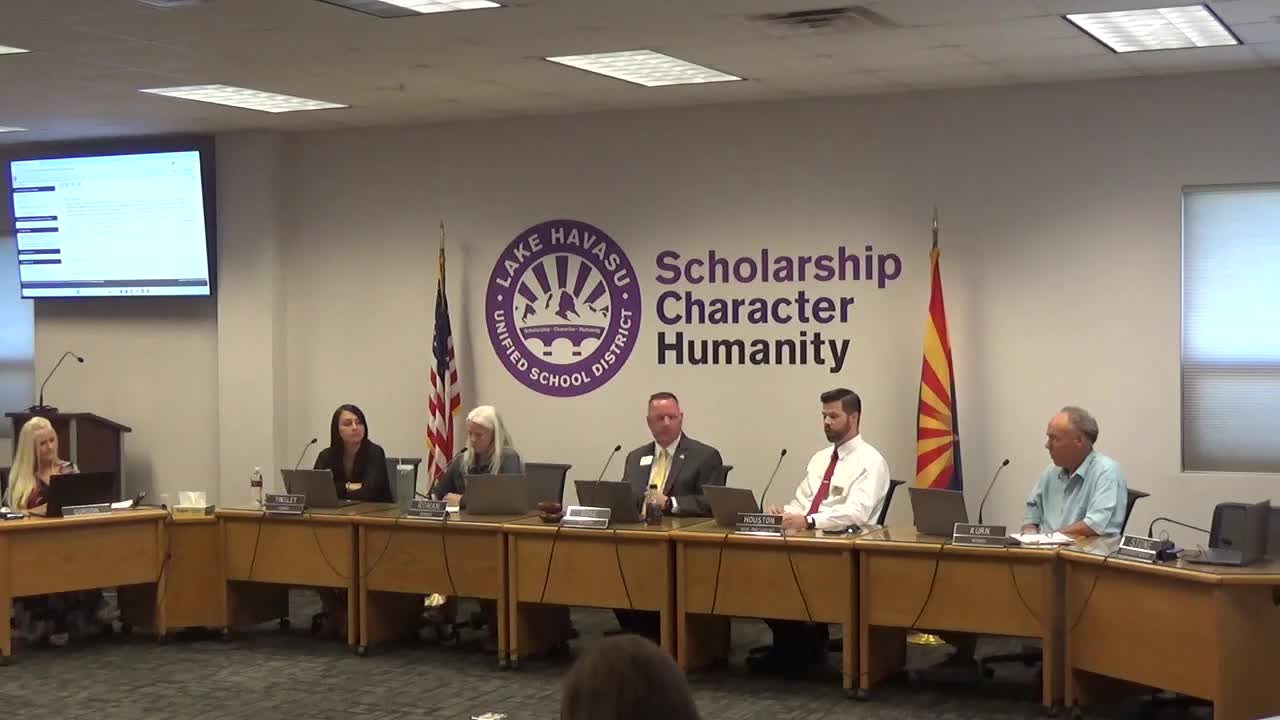School Board Implements New Cell Phone Policies for Middle and High School Students
August 02, 2025 | Lake Havasu Unified District (4368), School Districts, Arizona
This article was created by AI summarizing key points discussed. AI makes mistakes, so for full details and context, please refer to the video of the full meeting. Please report any errors so we can fix them. Report an error »

The Lake Havasu Unified District held a special session on July 31, 2025, to address various issues, with a significant focus on cell phone policies in schools. The meeting, which took place on August 2, 2025, included discussions on the management of student cell phone use and the consequences for violations.
The session began with a review of the current cell phone policy, which mandates that students place their phones in a designated area upon entering the classroom. This approach aims to minimize distractions and maintain a focused learning environment. Administrators reported that most students complied with this policy, with only a few instances of non-compliance addressed during the day.
A board member raised concerns about the effectiveness of current consequences for students caught using their phones inappropriately. The suggestion was made to implement a policy where confiscated phones would only be returned to parents, thereby creating a deterrent for students. However, another administrator expressed concerns about the potential risks to students who might need their phones for safety after school, leading to a reconsideration of strict confiscation policies.
The discussion then shifted to the specific consequences for cell phone violations. At the middle school level, the initial consequence involves lunch detentions, where students who violate the policy must spend their lunch period in a designated area, effectively removing them from social interactions. If violations continue, the consequences escalate to in-school suspension.
At the high school level, the first offense now results in six hours of detention, which also affects students' eligibility for extracurricular activities, including sports and dances. Subsequent offenses lead to more severe consequences, including in-school suspension and potential hearings for further disciplinary action.
The meeting concluded with a consensus on the need to clearly outline these consequences in the student code of conduct, ensuring that all students and parents are aware of the policies in place. The board emphasized the importance of balancing discipline with student safety, aiming to foster a respectful and productive educational environment.
The session began with a review of the current cell phone policy, which mandates that students place their phones in a designated area upon entering the classroom. This approach aims to minimize distractions and maintain a focused learning environment. Administrators reported that most students complied with this policy, with only a few instances of non-compliance addressed during the day.
A board member raised concerns about the effectiveness of current consequences for students caught using their phones inappropriately. The suggestion was made to implement a policy where confiscated phones would only be returned to parents, thereby creating a deterrent for students. However, another administrator expressed concerns about the potential risks to students who might need their phones for safety after school, leading to a reconsideration of strict confiscation policies.
The discussion then shifted to the specific consequences for cell phone violations. At the middle school level, the initial consequence involves lunch detentions, where students who violate the policy must spend their lunch period in a designated area, effectively removing them from social interactions. If violations continue, the consequences escalate to in-school suspension.
At the high school level, the first offense now results in six hours of detention, which also affects students' eligibility for extracurricular activities, including sports and dances. Subsequent offenses lead to more severe consequences, including in-school suspension and potential hearings for further disciplinary action.
The meeting concluded with a consensus on the need to clearly outline these consequences in the student code of conduct, ensuring that all students and parents are aware of the policies in place. The board emphasized the importance of balancing discipline with student safety, aiming to foster a respectful and productive educational environment.
View full meeting
This article is based on a recent meeting—watch the full video and explore the complete transcript for deeper insights into the discussion.
View full meeting
